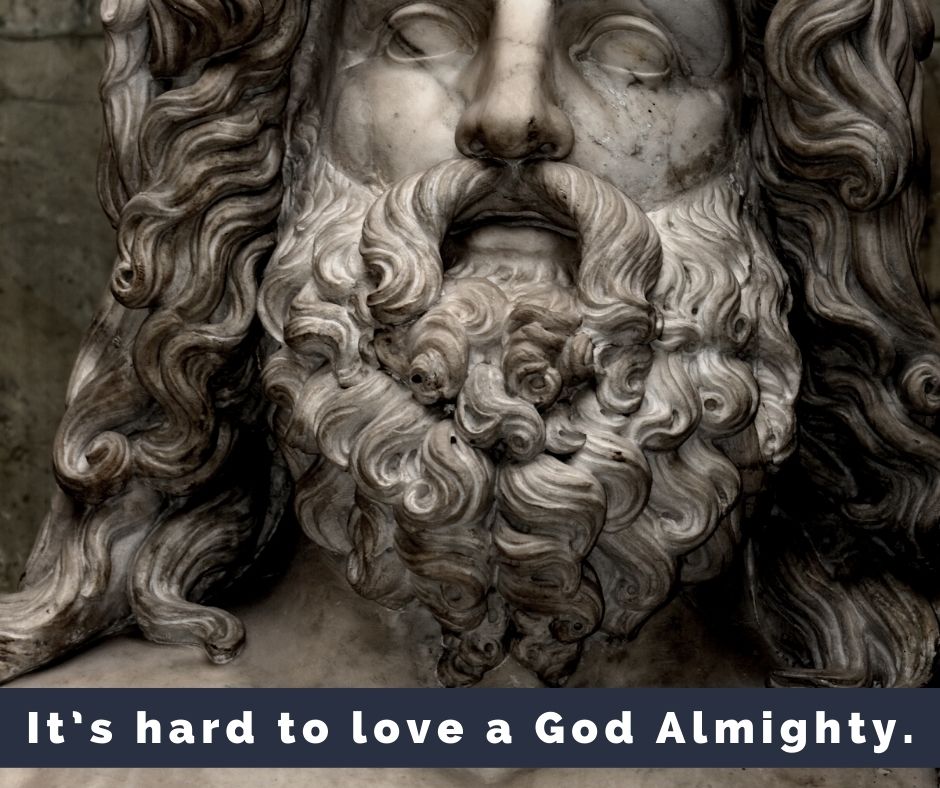Is God Omnipotent?

Most of us were taught that, along with being omniscient and omnipresent, God is omnipotent. But it’s hard to love a God Almighty.
Omnipotent isn’t in the Bible. It’s a term coined by thinkers influenced by Greek philosophy, who saw God as infinitely above us, the pinnacle of perfection. He—and the omnipotent deity definitely has a Y chromosome—is perfectly in control of everything. From way up there in heaven, He makes everything happen down here.
But what about when bad things happen to good people? Does God make that happen? Epicurus is bound to ask, “Is God willing to prevent evil, but not able? Then he is not omnipotent. Is he able, but not willing? Then he is malevolent. Is he both able and willing? Then whence cometh evil? Is he neither able nor willing? Then why call him God?”
Confronted with the obvious problems of omnipotence, we have scrambled for all kinds of work-arounds—some way to save this “God” from being a deity with zero affect. It’s better to acknowledge that the distant, theoretical God of Greek philosophy isn’t the God of the Bible. The Old Testament presents us with a God who, for better and for worse, is deeply in relationship with human beings. God doesn’t really control things—a love relationship cannot be controlled. Nobel Laureate and holocaust survivor Elie Wiesel once remarked that one of his professors asked the students who was the most tragic character in the Hebrew Bible. Some said, Moses or Abraham, but the professor said, “No—it’s God. Because nothing turns out the way he planned.”
And when God became human in Jesus, omnipotence really collapsed. Now we are presented with a God-Man who inverts all our human power pyramids, a God who suffers with us, who willingly lays down his need for control and insists we do the same.
Yes, we have an all-powerful God—just not in the way we were told. God’s power—if we can even imagine such a thing—“is made perfect in weakness” (2 Cor. 12:9). It shows us how love can triumph over all the things we cannot control, even death. And that, blessedly, is a God we can love.
Today’s Question:
“Is God Omnipotent?”
How does your image shift or change when you imagine God as sharing in our joy and suffering, showing us the transformative power of love, no matter what happens…rather than as a God who has the power to control everything that happens?
Question #8 “What Are You Chasing?” comes Sunday March 12.
David, another super-provocative essay. Well-written and well-reasoned.
But six years ago I resigned from the debating society. Or at least this debate. Six years ago I decided (after harsh mental consequences) I had to stop thinking about the problem of evil, about theodicy and all related topics. Theodicy for me is like liquor to the drunk, like drugs to the druggie, like Vegas to the compulsive gambler. Can’t go there. Don’t go there.
And (smiley-faced emoticon) I make no exception today.
I could say, “Well, I really didn’t plan to have this debate but then my dear friend David posted a beguiling essay and, you know, I sort of had to respond.”
Nope. Nada. Not gonna do it.
It’s not that the issues are unimportant. It’s not that I’m uninterested. It’s not that I’m uninformed. (I just remembered: somewhere on my hard drive I’ve saved 75 pages of notes on the subject).
But today, with God’s help, I abstain.
For Lent, some give up chocolate. I give up Theodicy.
This is incredible! The questions and the conclusion are profoundly important !
We struggle with the evil, and the despair that exists in the world. We want God to solve it! The questions of omnipotence focus on where the power lies. It’s as if we desire God to use power without acknowledging our personal responsibility. We forget that we are called to love our neighbor as ourselves, and that with our free will we can ALL follow Jesus model to address the evil in the world. But that requires us to do as Jesus did, and “turn the pyramid upside down” …. abandon our worldly ways.
Omnipotence is power’s supreme form.
God is love’s supreme form. The question is which do we desire to worship?
David, I really appreciate the questions you are asking. They provide me with the opportunity to teach myself what I believe, what I believe I know and, in rare cases, what I actually know.
Q: Is God omnipotent? A: Of course! That said, rather than state that God is this or that, I prefer to state that God IS and say no more.
The second sentence of your essay prompts a question. The sentence: “But it’s hard to love a God Almighty.”
The question: Why is it, or why would it be hard to love a God Almighty? What belief would have to be in place for one to have the consideration that it would be hard to love a God Almighty?
Another question that your essay has prompted David is whether or not God has an opposite. If God is omnipotent, is it possible for God to have an opposite?
On another note but still speaking of questions; are you familiar with Byron Katie and her four questions? I have found that her set of four questions that can be asked of any circumstance or situation, helps one to turn their attention away from the perceived external world and go within to the Kingdom of Heaven where all the answers to all the questions reside. The four questions
Is it true?
Can you absolutely know that its true?
How you react when you believe that thought? (notice this)
Who or what would you be without the thought?
Thank you David! I look forward to your next blog post.